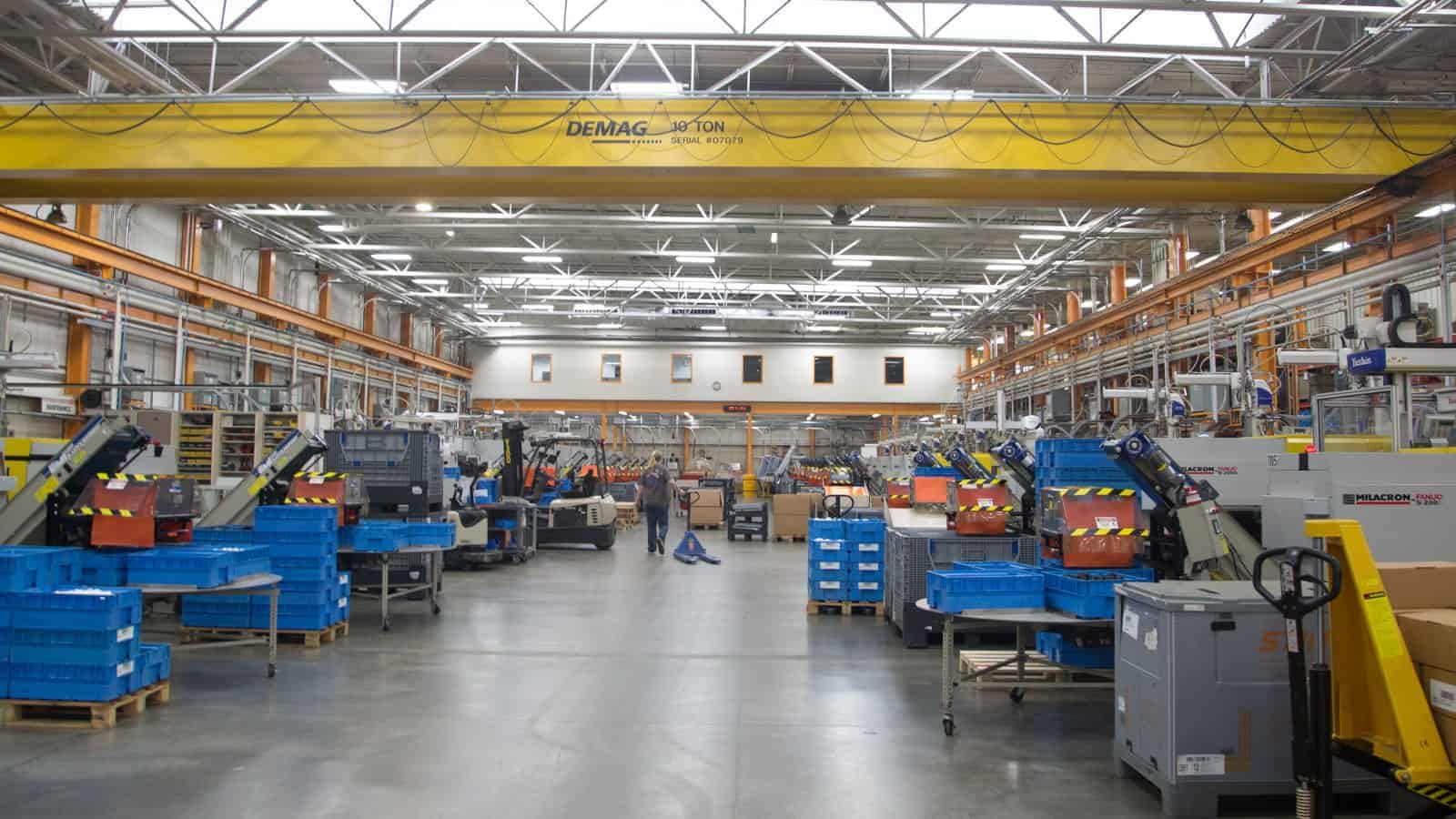Light-Touch AI Regulation Serves Manufacturers, Consumers Best

Artificial intelligence has become integral to modern manufacturing, which is why manufacturers support the Trump administration’s goal of making America globally dominant in AI, the NAM told the White House this month.
What’s going on: “[M]anufacturers use AI in myriad ways, which has made AI integral to modern manufacturing and put manufacturers at the forefront of developing and implementing AI systems,” the NAM told White House Office of Science and Technology Policy Acting Director Michael Kratsios and AI and Crypto Czar David Sacks last Friday in response to a request for information on the development of an AI action plan.
- The NAM supports President Trump’s stated goal of “sustain[ing] and enhance[ing] America’s global AI dominance in order to promote human flourishing, economic competitiveness and national security” while also, in Vice President Vance’s words, “avoid[ing] an overly precautionary regulatory regime.”
- The NAM has been one of the foremost voices for smart regulations on AI. Last May, it published “Working Smarter: How Manufacturers Are Using Artificial Intelligence,” a first-of-its-kind AI report on AI deployment in manufacturing and an accompanying list of suggested AI-policy actions Congress and the administration should take.
What should be done: To ensure that Americans benefit from AI safely and in a manner that does not unduly hamstring innovation, four specific steps should be taken, the NAM said:
- Direct regulators to update their frameworks for the AI age: “[M]anufacturers recommend that the AI Action Plan direct federal regulators to review the statutory and regulatory frameworks they maintain and enforce”;
- Customize AI regulations: “AI is context-specific, so ‘AI regulation’ should be too”;
- Transparency between AI vendors and users: The plan should direct [the National Institute of Standards and Technology] to work with the industry to develop best practices on how vendors explain how they develop and train their AI systems, to help companies defend their use of these AI systems in front of regulators.
- “Right-size” compliance burdens: “The ubiquitous use of AI throughout modern manufacturing, as well as manufacturing’s dependence on innovation, underscore the need for rules that enable rather than hinder manufacturers’ development and adoption of AI systems.”
Other critical needs: In addition, the NAM urges the administration to prioritize the following as part of its AI action plan:
- A “dual workforce strategy”: “The AI Action plan should make enhanced access to, and support for the development of, science, technology, engineering and mathematics (STEM) education programs throughout the country, at both the K-12 and higher education levels, a national priority … and increas[e] the allowable number of advanced degree STEM graduates for employment-based visa categories, in particular among lawful permanent residents.”
- Permitting reform and existing energy generation: The plan should endorse expedited judicial review and permitting processes for energy generation projects, working “with stakeholders to identify ways that the projected increase in demand growth can be leveraged to lower the cost curve of traditional light-water [nuclear] reactors” and look closely at the role of natural gas as a source of baseload power for the data center sector.
- Privacy and security: Work “with Congress to pass a national privacy law that fully preempts the growing patchwork of state laws, protects individuals’ privacy and provides much needed legal clarity to support continued innovation and competitiveness.”
Vance: Manufacturing Will See Renaissance Under Trump

Manufacturing in the U.S. will experience a renaissance under President Trump, Vice President JD Vance said Friday in an NAM-attended speech at Vantage Plastics in Bay City, Michigan.
What’s going on: Vice President Vance—whose talk was part of the Small Business Administration’s recently announced multistate Made in America Manufacturing Initiative and Made in America Roadshow—told the crowd of employees at the plastics processing facility that America’s achievements are contingent on the achievements of its manufacturers.
- “I really do believe that America’s success depends on the success of companies like Vantage Plastics,” he said. “And I don’t mean that in some abstract, poetic-sounding sense; I mean it literally. If we do not protect our nation’s manufacturers, we lose a fundamental part of who we are as a people. Making things, building things, working with our hands is America’s heritage, and that heritage is alive and well in this facility.”
- Vantage Plastics President Paul Aultman agreed. “Imagine how much stronger this country would be if every manufacturer—large and small, in cities and towns across America—had the tools to build, expand and succeed,” Aultman said. “Manufacturing is the backbone of America, and on shop floors like ours, we’re not just making products—we’re making the future.”
Relief from the onslaught: The Trump administration intends to protect manufacturers and in doing so, touch off a gilded age for the industry—by unburdening it of the many regulations that have been heaped upon it, said Vice President Vance.
- “The Trump administration is working hard to slash regulations left and right. … We’ve got to make it easier to build stuff in our own country. We can’t have people telling our great builders that if they want to start a factory or if they want to expand a factory, they’re not allowed to,” he said, echoing longtime NAM advocacy, backed by manufacturer surveys and data. “And that is the biggest thing, I think, the Trump administration is working on when it comes to renewing American manufacturing.”
- SBA Administrator Kelly Loeffler, who spoke prior to Vice President Vance at the event, sounded a similar note, saying, “The golden era of manufacturing in America is not behind us; it’s in front of us” (Detroit Free Press).
Energy unleashed: Vice President Vance discussed the administration’s NAM-supported move last week to review dozens of burdensome Environmental Protection Agency regulations.
- “These include the Greenhouse Gas Reporting Program, which cost U.S. factories and power plants hundreds of millions of dollars,” the vice president continued. “And that money is now going to be reinvested in American workers. And we remember the Clean Power Plan 2.0, which has imperiled America’s grid by creating impossible restrictions on coal and natural gas plants that account for 60% of our power. You can’t tell people to build in America while at the same time destroying American energy.”
A new path forward: Under President Trump, American manufacturing will have room to thrive, the vice president went on.
- “We are done overregulating American businesses. We are going to be guided by a simple principle: Build in this country. We cut your taxes, we reduce your regulation and we reduce your energy costs. Build in this country. Make American manufacturing great again. And we are going to fight for you—and the president will, too.”
- “Our goal is to make it easier and more affordable to make things again in the United States of America,” he said. “If you invest in American jobs and workers and businesses, you will be rewarded. We will cut your taxes, we will slash regulations and reduce the cost of industry in this country we all love.”
The last word: “President Trump and Vice President Vance understand what manufacturing means to America—not just in economic terms, but also in human terms,” NAM President and CEO Jay Timmons said.
- “But we can only reach our full potential with the type of leadership that will make the 2017 tax reforms that were rocket fuel for the manufacturing industry permanent, rebalance the regulatory framework, expedite permitting reform to unleash American energy, grow the manufacturing workforce and implement sensible trade policies. That’s how we make America strong, prosperous and proud. That’s how we will Make America Great for Manufacturing Again.”
NAM Urges D.C. Circuit to Preserve SEC’s Ability to Regulate Proxy Firms
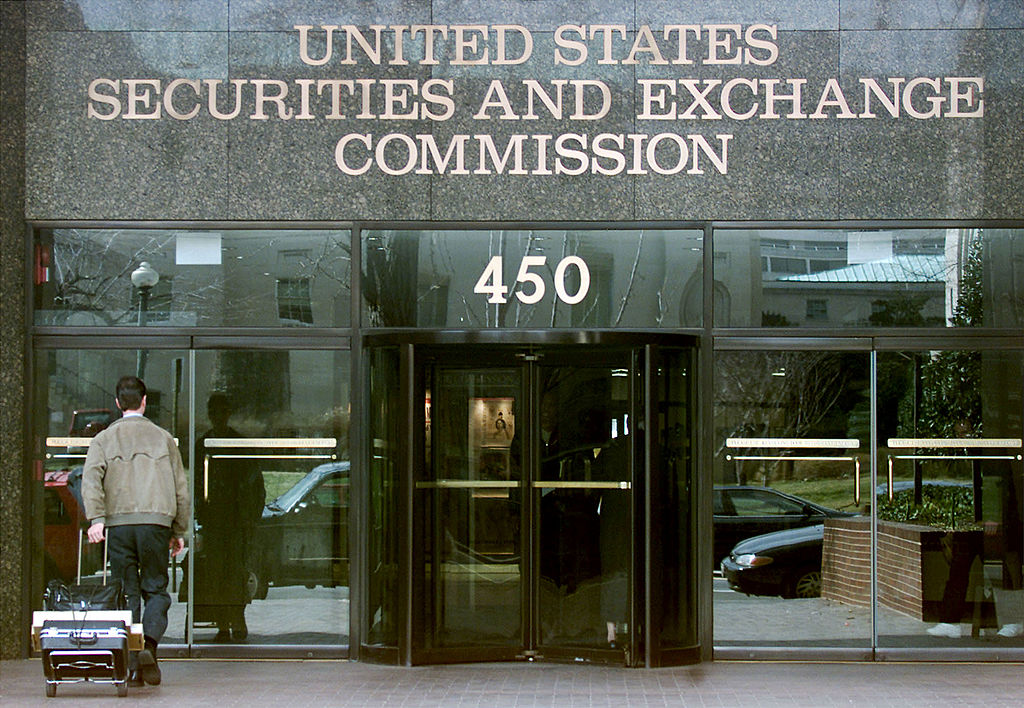
The Securities and Exchange Commission clearly has the authority to “adopt commonsense measures to protect investors” from “the most influential voices” in the proxy voting process: proxy advisory firms, the NAM’s Legal Center told the U.S. District Court of Appeals for the D.C. Circuit this week.
What’s going on: On Thursday, the NAM filed a reply brief in Institutional Shareholder Services Inc. v. Securities and Exchange Commission—a challenge, launched in 2019 by ISS, to the SEC’s statutory authority to enact critical proxy firm reforms.
- With its main competitor, Glass Lewis, ISS controls 97% of the proxy advice market and influences nearly 40% of the U.S. shareholder vote. Proxy firms are large, influential and unregulated entities that frequently dictate how shareholders should vote on proxy ballot proposals that come before public companies.
- The NAM’s brief explains that the SEC is “well within its statutory authority over the proxy process to regulate the entities that exert perhaps the greatest influence on that process” and asks the court to overturn a lower court’s ruling last February holding that the SEC lacks the authority.
- The brief is our latest move in a years-long effort to ensure reasonable oversight and regulation of proxy firms.
The background: In 2020, the SEC finalized an NAM-backed rule that put into place critical proxy firm reforms, including a requirement that the firms disclose any conflicts of interest.
- Though the NAM successfully fought across multiple pieces of litigation to preserve the 2020 rule, the SEC itself chose not to appeal the ISS case after a district court in 2024 sided with ISS in the proxy firm’s suit against the SEC.
- The NAM as intervenor-appellant has remained in the fight, making manufacturers the sole bulwark against proxy firms’ unchecked power.
- A victory for the NAM in the D.C. Circuit would make the proxy firms subject to the 2020 rule’s important reforms.
Why it’s crucial: Proxy firms “pose a real threat to Americans’ financial security,” NAM Managing Vice President of Policy Charles Crain told Congress in September.
- “Their errors and conflicts of interest put their own profits above Main Street investors’ retirement savings, their inflexible policies and refusal to engage with companies result in one-size-fits-all recommendations, their robo-voting swings investor votes in their favor and they advance ESG agendas that ignore, or even harm, shareholder value.”
President Trump’s EPA Takes Steps To Rebalance Harmful PM2.5 Rule That Stifles Manufacturing Growth
National Association of Manufacturers Led National Campaign to Defeat Burdensome Rule That Prevents Manufacturers from Investing Across the Country
Washington, D.C. – In response to an announcement—spurred by National Association of Manufacturers–led advocacy—by the Environmental Protection Agency to revise and review burdensome federal regulations harming America’s manufacturers, NAM President and CEO Jay Timmons released the following statement:
“President Donald Trump and EPA Administrator Lee Zeldin have answered the calls of manufacturers across the country to rebalance and reconsider burdensome federal regulations harming America’s ability to compete—including the previous administration’s unworkable PM2.5 NAAQS rule. In December, the NAM, along with more than 100 manufacturing associations, sent a letter to President Trump highlighting more than three dozen regulatory actions the administration should take to put a stop to the regulatory onslaught that is costing manufacturers $350 billion each year—many of which are included in today’s EPA announcement.
“Most prominently, the Trump administration will be reconsidering the 2024 PM2.5 rule—an unrealistic and unworkable rule that will result in significantly diminished manufacturing investment and job creation. Manufacturers warned the Biden administration of the severe economic consequences that could result from tightened PM2.5 regulations: a PM2.5 standard of 8 micrograms per cubic meter of air—only slightly below the newly finalized level—would have resulted in a loss of up to $200 billion in economic activity and almost 1 million jobs, according to research from the NAM. When those warnings were ignored, the NAM took the fight to court—asking the D.C. Circuit to vacate the rule.
“Similarly, the administration is reconsidering the Biden administration’s power plant rule, which threatened grid reliability by creating an unrealistic timeline for power plants to adopt emissions-reduction technologies that are unproven at scale—creating a threat to our national and economic security that literally could leave Americans in the dark and factories offline.
“Additionally, the EPA will be reviewing and revising other burdensome regulations in the air and chemicals space, and the NAM welcomes the opportunity to right-size these regulations that stunted manufacturing growth and job creation. Manufacturers will continue to partner with the EPA to rebalance the regulatory framework to allow our industry to move ahead with transformational investments that will strengthen our manufacturing nation.”
Background:
In a letter to President Trump signed by more than 100 manufacturing associations in December, the NAM highlighted more than three dozen regulatory actions the Trump administration could take to support manufacturing growth. Today’s announcement by the EPA addresses many of the regulations that we outlined, including the following:
- National Ambient Air Quality Standards for Particulate Matter: Reconsider and relax the Biden administration’s NAAQS for PM2.5 rule.
- Power Plant Rules: Replace the EPA’s rule for existing coal-fired and new natural gas–fired power plants with workable standards.
- Vehicle Regulations: Provide the long-term regulatory certainty America’s auto sector requires to meet all facets of customer demand while continuing to lead in innovation and emissions reduction.
- Waters of the United States: Ensure regulatory decision-making under the Clean Water Act fully conforms with the Supreme Court’s bright-line jurisdictional test.
- Reconsideration of Certain NESHAPs: Reconsideration of the Ethylene Oxide National Emission Standards for Hazardous Air Pollutants
-NAM-
The National Association of Manufacturers is the largest manufacturing association in the United States, representing small and large manufacturers in every industrial sector and in all 50 states. Manufacturing employs nearly 13 million men and women, contributes $2.93 trillion to the U.S. economy annually and accounts for 53% of private-sector research and development. The NAM is the powerful voice of the manufacturing community and the leading advocate for a policy agenda that helps manufacturers compete in the global economy and create jobs across the United States. For more information about the NAM or to follow us on Twitter and Facebook, please visit www.nam.org.
Survey: Trade Policies Shake Up Manufacturers’ Economic Outlook

Manufacturers are increasingly worried about the future of trade and rising raw material costs, according to the Q1 2025 NAM Manufacturers’ Outlook Survey.
What’s going on: In the most recent survey, conducted from Feb. 11 to Feb. 28, trade uncertainties moved to the top of the list of manufacturers’ concerns—with 76.2% of respondents citing them as their primary worry. Increased raw material costs came in second, cited by 62.3% of those surveyed.
- In fact, manufacturers expect prices on their companies’ product lines to go up by 3.6% in the next year, an increase from 2.3% in Q4 2024 and the highest since Q3 2022, when inflation was more than 8%.
- Manufacturers also anticipate the cost of raw materials and other inputs to rise 5.5% in the next year, the highest expected rate of increase since Q2 2022, when inflation was between 8% and 9%.
- Manufacturers foresee export sales to increase just 0.1% in the next year. That’s the lowest anticipated rise since Q2 2020 at the height of the COVID-19 pandemic.
- In addition, the percentage of manufacturers with a positive outlook for their company inched down from the last quarter, to 69.7% from 70.9%.
Taxes: Manufacturers also feel strongly that their businesses need the “rocket fuel” of the tax reform extension. If Congress fails to extend pro-manufacturing provisions of the Tax Cuts and Jobs Act of 2017:
- 69.35% of respondents said they would delay capital equipment purchases;
- 45.23% would delay hiring;
- 44.72% would pause operations expansions;
- 41.71% would limit R&D investment; and
- 40.20% would curb employee wages or benefits increases.
Our take: “The pressure of increased costs, trade instability and sluggish demand is dampening the sector’s momentum, making it more difficult for manufacturers to plan, invest and hire,” NAM President and CEO Jay Timmons wrote in a social post Thursday.
- “We are calling for a comprehensive manufacturing strategy that includes a commonsense trade policy in addition to making President Trump’s 2017 tax reforms permanent and more competitive, securing regulatory certainty, expediting permitting reform to unleash American energy dominance and key manufacturing projects and increasing the talent pool.”
NAM, Allies: Reject Reintroduced PRO-Act

The Richard L. Trumka Protecting the Right to Organize Act, reintroduced this week, would harm manufacturers and their employees alike if it passes, the NAM and allied organizations told the Senate Tuesday.
What’s going on: The PRO Act, reintroduced Wednesday by Sen. Bernie Sanders (I-VT) and Rep. Bobby Scott (D-VA), purports to broaden labor protections for workers.
- In truth, however, it “would limit workers’ right to secret ballot union representation elections, allow government bureaucrats to unilaterally impose contracts on the private sector, trample free speech and debate, jeopardize industrial stability and limit opportunities for small businesses and entrepreneurs,” according to the Coalition for a Democratic Workplace, a group of organizations representing employers and employees. The NAM is a member.
Why it’s a problem: “The PRO Act is designed to push union representation on workers whether they want it or not,” the coalition said. The legislation would do this by:
- Limiting the right of employees to vote for or against union representation via secret ballot, instead instituting “card check”;
- Limiting employees’ right to free speech, effectively silencing debate;
- Giving the government unprecedented control over private-sector employment contracts;
- Requiring employers to give union organizers employees’ personal information without the employees’ consent;
- Eliminating right-to-work protections nationwide; and
- Allowing unions to choose a bargaining unit that maximizes its chances of winning an election instead of having the National Labor Relations Board choose a unit fairly.
The “ABC test”: In addition, the PRO Act would limit people’s opportunities for self-employment by imposing California’s failed “ABC test” on workers to determine whether they are independent contractors or employees.
- “The ABC test makes it very difficult for someone to work as an independent contractor by defining the term ‘employee’ very broadly,” the groups told the Senate. “Nationwide implementation would forcibly reclassify millions of workers who routinely say they do not want a traditional employee relationship and prize the flexibility and autonomy independent contracting provides.”
Joint employment: The measure would also replace the existing standard for determining who is a “joint employer” under federal labor law with a much broader, more vague definition.
- “The current standard focuses on whether the potential employers have direct and immediate control over employees. The PRO Act standard, on the other hand, would establish joint employment liability based on indirect or even just reserved control.”
- “It would overturn decades of established labor law and undermine nearly every contractual relationship, from the franchise model to those between contractors and subcontractors and suppliers and vendors.”
The economic impact: The PRO Act would be economically devastating to companies, workers and the country, the coalition said.
- The measure’s independent worker classification alone could cost up to $57 billion nationwide, while its joint-employer standard would cost franchises as much as $33.3 billion annually.
- This would mean more than 350,000 job losses and a 93% spike in lawsuits.
Manufacturers to Trump and Congress: Act Now on Comprehensive, Commonsense Manufacturing Strategy as Tariffs Hit Manufacturing Industry
National Association of Manufacturers President and CEO Jay Timmons released the following statement ahead of President Donald Trump’s address to a joint session of Congress:
“The stakes couldn’t be higher for manufacturers right now. Many manufacturers are operating on thin margins, and the tariffs imposed today will further strain their resources. For example:
- A large manufacturer in the power-engineering sector that imports more than $100 million every year in components and products from Mexico now faces increasing costs of $25 million due to the tariffs. As a major supplier to the U.S. utility and industrial market, this will directly impact the ability for domestic utilities and industrial customers to maintain a safe, efficient and secure power grid.
- Another large consumer goods manufacturer indicated the tariffs on Mexico will cost their company $200 million, and the Canadian retaliatory tariffs will add another $31 million—totaling $231 million, or $1.15 million per day.
- A small copper manufacturer had nine truckloads of copper rod sitting at the Canadian border waiting to go through Customs when the tariffs went into effect, leading to 388,000 pounds of copper goods being returned to the supplier. If the tariffs remain in effect, bringing copper—a critical manufacturing input—into the U.S. would cost the manufacturer nearly $50,000 per truckload going forward.
“To mitigate the adverse effects of today’s tariffs, manufacturers call on President Trump and Congress to implement a comprehensive manufacturing strategy that would create predictability and certainty to invest, plan and hire in America. This strategy includes the following actions:
- Make President Trump’s 2017 tax reforms permanent and more competitive now. When President Trump signed these tax cuts into law, it was rocket fuel for manufacturing in America and made the U.S. economy more competitive on a global scale. That fuel is about to run out as key provisions have expired, and others are about to lapse. If Congress fails to act, it will cost America 6 million jobs, including more than 1.1 million manufacturing jobs. We must ensure these historic, pro-growth manufacturing provisions are made permanent and even more competitive so manufacturers can plan, grow and succeed.
- Restore regulatory certainty. Manufacturers are spending $350 billion each year just to comply with regulations—money that could be spent on expanding factories and production lines, hiring new workers or raising wages. President Trump has taken action already to streamline burdensome regulations starting with lifting the liquefied natural gas export ban, but we need to move faster to deliver on our industry’s potential.
- Expedite permitting reform to unleash American energy. President Trump is already ending the war on America’s energy producers, but there is more work to do. America should be the undisputed leader in energy production and innovation, but we will not reach our full potential without permitting reform. We are seeing opportunities for energy dominance fade in the face of a permitting process that takes 80% longer than other major, developed nations.
- Strengthen the manufacturing workforce. Over the past year, we have averaged 500,000 open manufacturing jobs in America—well-paying, life-changing careers. Manufacturers are struggling to fill critical jobs. We need a real workforce strategy that ensures we have the talent to grow, compete and lead.
- Implement commonsense trade policies that open global markets fairly and effectively. Building things in America only works if we can sell them around the world. That’s why we’re urging President Trump and Congress to provide greater predictability and a clear runway for manufacturers to adjust to new trade realities, while also making way for exemptions for critical inputs, enabling reciprocity in manufacturing trade.
“Manufacturers are investing in America in record numbers, and President Trump is focused on strengthening manufacturing in the United States to grow our nation’s economy. We look forward to working with President Trump as he works to advance policies that will help manufacturers thrive and prosper because when manufacturing wins, America wins.”
-NAM-
The National Association of Manufacturers is the largest manufacturing association in the United States, representing small and large manufacturers in every industrial sector and in all 50 states. Manufacturing employs nearly 13 million men and women, contributes $2.93 trillion to the U.S. economy annually and accounts for 53% of private-sector research and development. The NAM is the powerful voice of the manufacturing community and the leading advocate for a policy agenda that helps manufacturers compete in the global economy and create jobs across the United States. For more information about the NAM or to follow us on Twitter and Facebook, please visit www.nam.org.
Lilly: 2017 Tax Reform Makes Four New U.S. Manufacturing Sites Possible
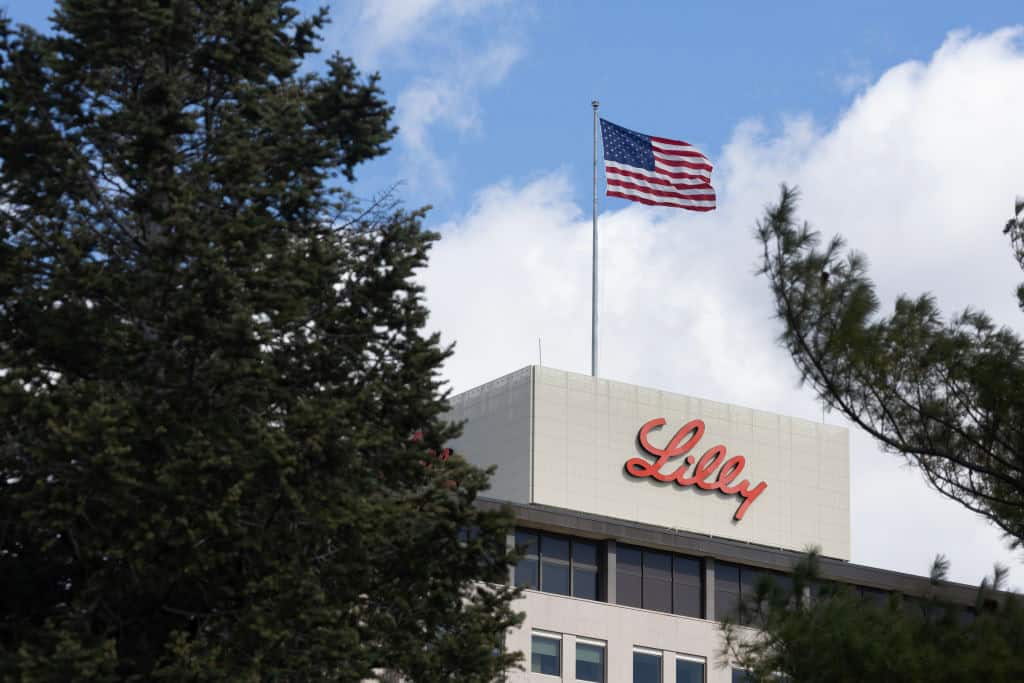
Biopharmaceutical company Lilly will build four new manufacturing sites across the U.S., it announced Wednesday at a Washington, D.C., press conference. The event was attended by NAM President and CEO Jay Timmons, Commerce Secretary Howard Lutnick, National Economic Council Director Kevin Hassett, Indiana Sen. Todd Young and Lilly Executive Vice President and President of Manufacturing Operations (and NAM board member) Edgardo Hernandez, among others.
What’s going on: Three of the planned manufacturing campuses will focus on producing active pharmaceutical ingredients, reshoring “critical capabilities of small molecule synthesis and further strengthening Lilly’s supply chain,” the company said in a press release. The fourth site will “extend [Lilly’s] global parenteral manufacturing network for future injectable therapies.”
- The investment in the four sites will bring Lilly’s total U.S. capital expansion commitment to more than $50 billion since 2020.
- Lilly—which in recent years has made $23 billion worth of investments in new research and manufacturing sites in the American South and Midwest—is in talks with several states about building the facilities there, but it is accepting additional expressions of interest from states until March 12.
The anticipated benefit: The four sites are expected to create more than 3,000 permanent skilled jobs and more than 10,000 construction jobs during building, according to the company.
The tax reform factor: Lilly’s planned expansion reflects “decades of research and dedication,” Timmons said at the event announcing the investment. It “is the culmination of sustained planning made possible by the certainty created through smart public policy—particularly the 2017 tax reforms that President Trump … championed back at a meeting of the NAM Board of Directors in September 2017.”
- Many of those manufacturing-critical reforms have been allowed to expire, however, and others will expire at the end of the year—unless Congress acts, and soon, Lilly Chair and CEO David Ricks said.
- “The Tax Cuts and Jobs Act legislation passed in 2017 during President Trump’s first term in office has been foundational to Lilly’s domestic manufacturing investments, and it is essential that these policies are extended this year.”
Keep the momentum going: Lilly’s announcement shows other manufacturers “exactly why [they] have reason for optimism and confidence,” Timmons went on. “But to keep this momentum going—to encourage more groundbreaking investments, more job creation and more life-changing innovation—a comprehensive manufacturing strategy must become the reality … because when manufacturing wins, America wins.”
Timmons to Congress: Maintain Momentum with Tax Reform Preservation
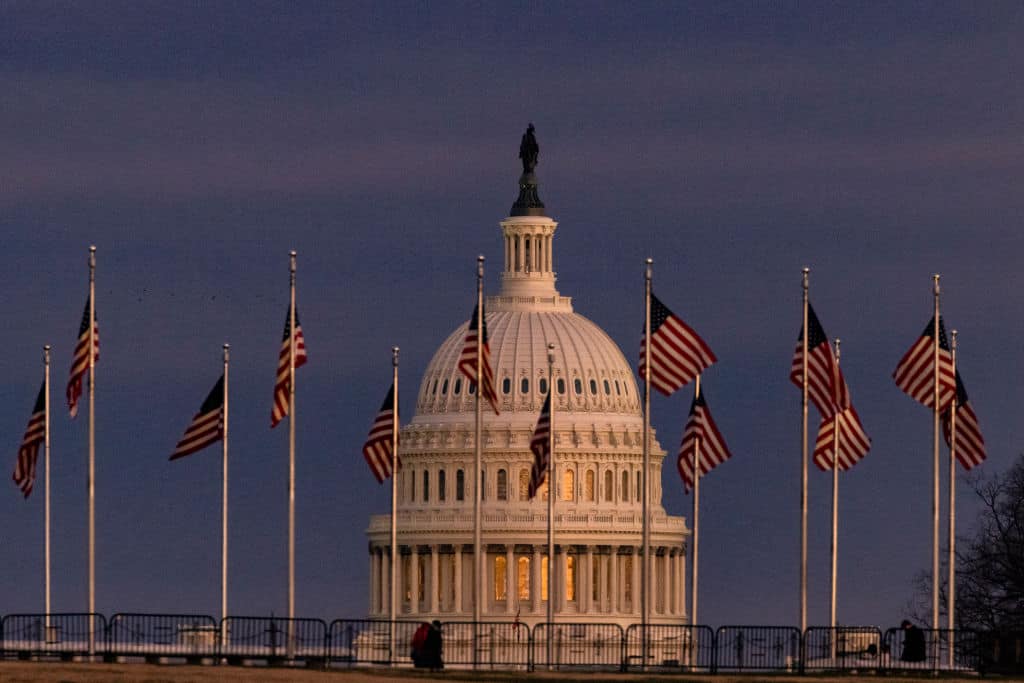
The House late Tuesday approved a Republican budget blueprint for President Trump’s tax-cut and border-security agenda (Reuters, subscription).
- NAM President and CEO Jay Timmons called the move “a historic, pivotal step to[ward] advanc[ing] a comprehensive reconciliation package that will preserve” critical pro-manufacturing tax reforms and unleash “American energy dominance.”
What’s going on: “The measure is a preliminary step to extending Trump’s 2017 tax cuts later this year,” Reuters reports. “Tuesday’s vote sent the budget resolution to the Senate, where Republicans are expected to take it up.”
- The plan—which calls for $4 trillion to $4.5 trillion in tax cuts and $1.5 trillion to $2 trillion in spending reduction over 10 years—also includes measures to increase domestic energy development and production.
Why it’s so important: Congress must capitalize on the momentum of the budget resolution’s passage by preserving the crucial tax reform measures from President Trump’s 2017 Tax Cuts and Jobs Act, Timmons continued—because “[e]very day we wait means jobs and opportunity lost.”
- “As part of the comprehensive, commonsense manufacturing strategy that America needs, protecting tax reform will strengthen our industry and our communities. It’s time to continue this momentum and act now to Make America Great for Manufacturing Again. When manufacturing wins, America wins.”
What’s next: House Speaker Mike Johnson (R-LA) has said he anticipates passing the tax, energy, border-security and defense items via reconciliation by the first week of April.
State of Manufacturing 2025: When Manufacturing Wins, America Wins
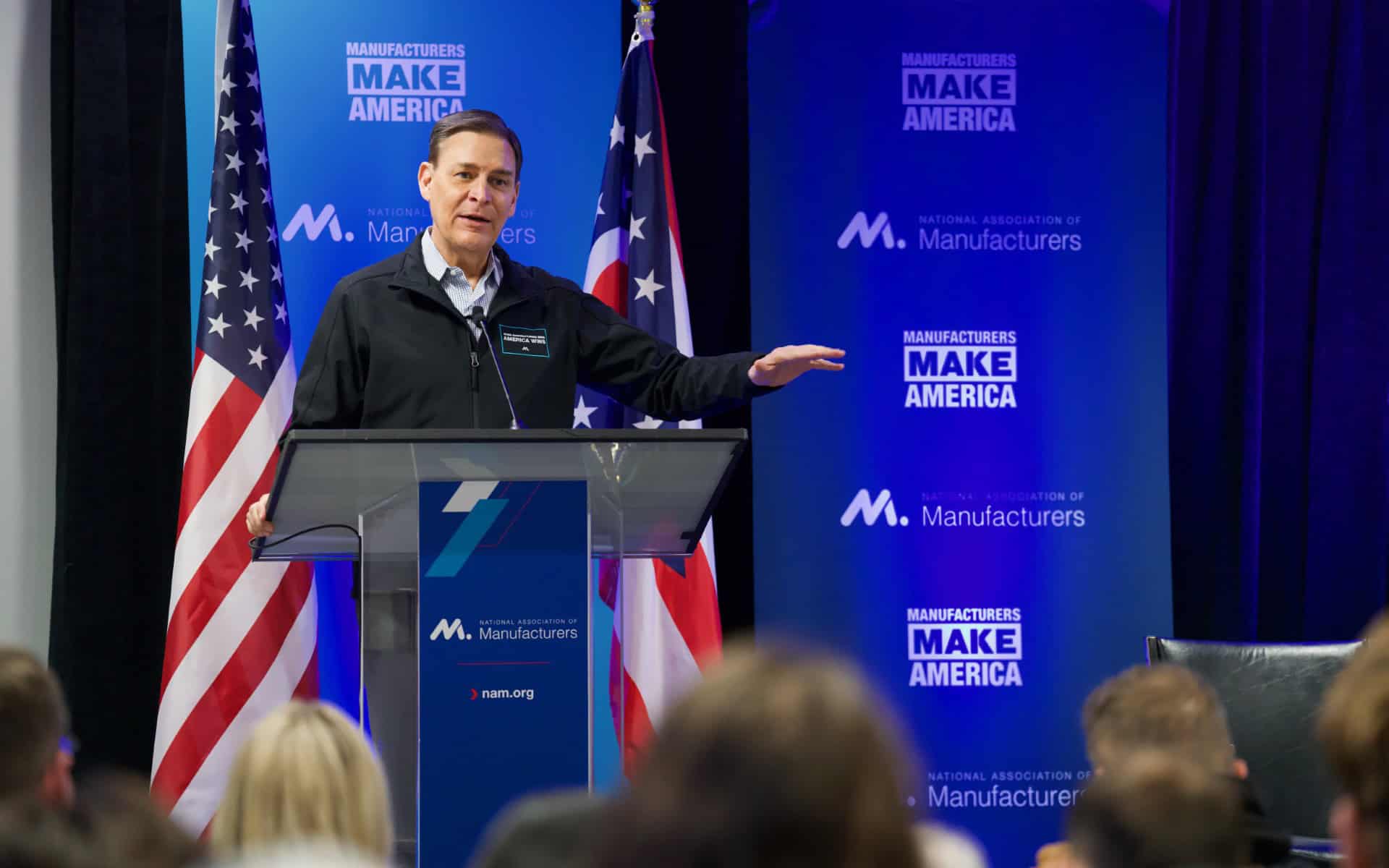
“Manufacturing in the U.S. has momentum”—and to keep it going, manufacturers will need to push, NAM President and CEO Jay Timmons said Tuesday in the NAM’s annual State of Manufacturing Address.
What’s going on: Speaking to an audience of manufacturers and congressional and state officials at Armstrong World Industries in Hilliard, Ohio, Timmons, who was joined by NAM Board Chair and Johnson & Johnson Executive Vice President and Chief Technical Operations & Risk Officer Kathy Wengel, emphasized the “defining moment” for the industry and said that for manufacturing, “what happens next really matters.”
- “Uncertainty is the enemy of investment,” he told the crowd. “Manufacturing is a capital-intensive industry. We make decisions months and years in advance. … That’s why we need certainty. We need a clear, actionable, multistep strategy from our government—one that says, ‘We want you to invest here, hire here and succeed here.’”
- Timmons’ annual speech kicked off the NAM’s 2025 Competing to Win Tour, starting with a whirlwind four-states-in-four-days tour of manufacturing facilities, schools, government offices and more.
- “In Ohio, manufacturers have thrived because our leaders have taken decisive actions to keep our industry competitive,” Ohio Manufacturers’ Association President Ryan Augsburger said at the kickoff event. But now, “manufacturers across Ohio and the nation are facing critical challenges, from tax uncertainty, project delays and workforce shortages to supply chain vulnerabilities and price pressures that threaten our ability to grow. … These issues cannot wait.”
What manufacturing needs: Certainty from the federal government should come in several forms, Timmons said, including the following:
- Preserving tax reform: The 2017 tax reforms were “rocket fuel” for manufacturing in America—but key provisions have expired and others are scheduled to sunset. Congress must bring them back and improve and extend the package. “Every day that Congress delays because of process and politics, manufacturers face rising uncertainty, delayed investments and fewer jobs,” said Timmons.
- Regulatory clarity and consistency: Manufacturers today spend a total of $350 billion just to comply with regulations. “Commonsense regulation is critical to American manufacturers to continue to innovate, to compete against foreign manufacturers and to improve the lives of American citizens,” Austin So, general counsel, head of government relations and chief sustainability officer for Armstrong World Industries, told the crowd.
- Permitting reform: President Trump’s lifting of the liquefied natural gas export permit ban was a start, but to reach our full potential as energy leader, we must require “federal agencies to make faster decisions and reduc[e] baseless litigation,” said Timmons.
- Energy dominance: “America should be the undisputed leader in energy production and innovation. But … we are seeing opportunities for energy dominance fade in the face of a permitting process that takes 80% longer than other major, developed nations,” Timmons said, adding that we must cut red tape, require federal agencies to make faster decisions and reduce meritless litigation.
- Workforce strategy: By 2033, manufacturing faces a shortfall of 1.9 million manufacturing employees, Timmons said. To fill those positions, the sector needs a “real workforce strategy,” one that includes apprenticeships, training programs and public–private partnerships.
- Commonsense trade policy: If President Trump continues to use tariffs, “we need a commonsense policy … that provides manufacturers with the certainty to invest” and “a clear runway to adjust,” according to Timmons.
State of manufacturing: “Manufacturing in the United States is moving forward,” Timmons said. “Like a press at full speed, like a production line firing on all cylinders, like the workers who show up before dawn and leave long after the job is done—manufacturing in the United States is driving us forward.” And Timmons added that now it’s time “to make America Great for Manufacturing Again.”
On the move: Following the speech, Timmons, Wengel and Augsburger joined state lawmakers, including state Sens. Kristina Roegner and Andrew Brenner, and local business leaders for a visit to the Ohio Statehouse for an event focused on the importance of tax reform for Ohio and its manufacturing sector.
- A recent NAM study found that, if key provisions of tax reform are allowed to expire, Ohio would risk losing 208,000 jobs and $18.9 billion in wages.
What’s at stake: Tax reform was transformational for Humtown Products, the Columbiana, Ohio–based family-owned sand cores and molds manufacturer, President and CEO Mark Lamoncha told the audience at the Ohio Statehouse tax event.
- “We have been at the forefront of 3D-printed manufacturing for years and have invested significantly in the machinery and equipment required, including the purchase of 3D printers—one of which can easily cost over $1 million,” he said.
- “Since the 2017 tax reform, Humtown has invested over $9 million in capital expenditures related to 3D printing and averages around $100,000 annually in R&D costs. Under the 2017 tax reform, we were able to deduct 100% of those costs, generating around $1.6 million in accelerated tax savings.”
- “That amount alone allowed us to purchase another 3D printer, fueling continued growth. That’s what tax certainty allowed us to do. But right now, that certainty is slipping away. As these provisions begin to expire, our tax burden is increasing.”
Creators Wanted: The group also fit in a stop at Columbus State Community College, which serves approximately 41,000 students, to visit with students in the semiconductor and mechanical drive classes.
The last word: The NAM recently “stood shoulder-to-shoulder with congressional leaders—delivering a clear, urgent message on tax reform” and is “driving the agenda on regulatory certainty, on energy dominance, on permitting reform, health care and workforce development,” Wengel told the audience. “The NAM is not waiting for Washington to act; we are making sure Washington acts for you, for manufacturers.”
- Added NAM Executive Vice President Erin Streeter: “The NAM is on [these issues], and we’re going to keep fighting, as we do every day with the right leaders, the right strategies and the right vision for the future.”
